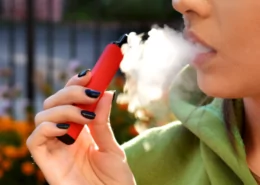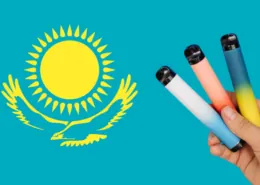Kazakhstan Introduces Strict Vape Ban: Understanding the New Law and Its Consequences
Kazakhstan has implemented a new law banning the sale, distribution, and import of vapes, commonly referred to as “disposables,” which are popular among the country’s citizens. While using vapes will not result in penalties, any involvement in their sale, distribution, or importation now carries serious criminal consequences.
Violations and Penalties
Sale and Distribution
Amendments to the health care law have introduced changes to the Criminal Code, specifically Article 301-1, which addresses the “Circulation of smokeless tobacco products, electronic consumption systems (vapes), flavors, and liquids for them.” Under Part 1 of this article, penalties for selling and distributing vapes include:
- Fines up to 200 MCI (738,400 tenge in 2024)
- Community service for up to 200 hours
- Arrest for up to 50 days
Import and Production
Part 2 outlines the consequences for the import and production of vapes:
- Fines up to 2,000 MCI (7.3 million tenge in 2024)
- Community service for up to 600 hours
- Restriction or imprisonment for up to 2 years
Severe Penalties for Criminal Groups
For criminal groups repeatedly involved in these activities, or if the actions result in significant financial gain, the penalties are more severe:
- Fines up to 5,000 MCI (18.4 million tenge in 2024)
- Community service for up to 1,200 hours
- Restriction or imprisonment for up to 5 years
Definition of “Distribution”
The Ministry of Internal Affairs has clarified that “distribution” encompasses the transfer of vapes to others in any form, irrespective of financial or other benefits.
“Distribution should be understood as the transfer of vapes to other persons. Distribution entails criminal liability for committing it in any form without taking into account material or other benefits,” stated the Ministry in response to an inquiry from Tengrinews.
Penalties for Smoking Vapes
Smoking vapes in unauthorized locations will incur the same penalties as smoking cigarettes, which is a fine of 3 MCI (11,076 tenge in 2024).
Definitions and Regulations
The amendments also introduce precise definitions for vapes within the “Code on Public Health and the Healthcare System.” According to the code:
“Electronic consumption systems, vapes or electronic nicotine delivery systems and electronic delivery systems for products that are not nicotine are devices (including electronic cigarettes) that, using electronic technology (battery), heat liquid (in cartridges, tanks and other containers) with or without nicotine, other chemicals, flavorings to form an aerosol inhaled by the user.”
Additional Terms
The following terms are also defined in the code:
- Flavoring for electronic consumption systems
- Electronic consumption systems and liquids for them
- Smokeless tobacco products
- Products that imitate tobacco products
On April 19, President Kassym-Jomart Tokayev signed the law “On Amendments and Supplements to Certain Legislative Acts of the Republic of Kazakhstan on Healthcare Issues,” reinforcing the country’s stance on vaping regulations.
For more details on this legislation and its broader implications, stay informed with our continuous coverage.
Conclusion
The introduction of this strict vape ban in Kazakhstan marks a significant step in the government’s efforts to address the growing concerns surrounding the use of these devices, particularly among young people. By imposing severe penalties on the sale, distribution, import, and production of vapes, the authorities aim to curb their availability and discourage their use.
As the law takes effect, it is crucial for Kazakhstanis to familiarize themselves with the new regulations and understand the potential consequences of engaging in vape-related activities. The government’s commitment to enforcing these measures underscores the seriousness with which it views the issue of vape use and its potential impact on public health.
- Austria Plans to Ban Disposable E-Cigarettes - August 5, 2025
- Vaping vs. THC Drinks: Which Cannabis Option Is Right for You? - August 4, 2025
- Colombia’s New Vape Law: A Reality Check on Enforcement - August 4, 2025







